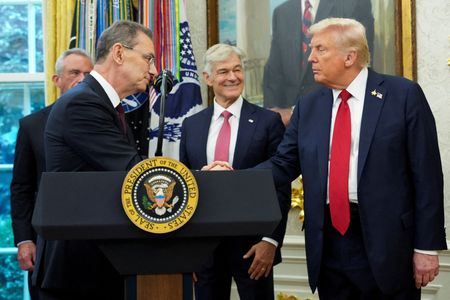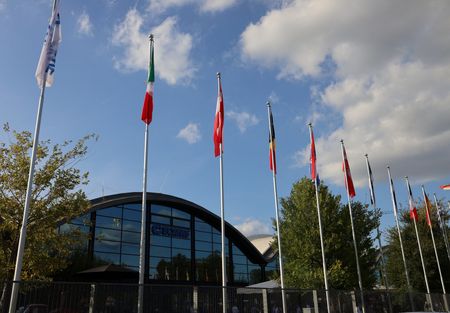By Olivia Le Poidevin and Cecile Mantovani
GENEVA (Reuters) -Swiss pharma companies are likely to follow Pfizer’s price deal with the U.S. following President Donald Trump’s push to lower drug prices, the head of a major Swiss chemical and pharmaceutical industry association said on Wednesday. Pfizer and Trump said on Tuesday they had agreed a deal in which the U.S. company would lower prescription drug prices in a Medicaid programme to match those it charges in other developed countries in exchange for tariff relief.
In July, Trump sent letters to 17 leading drug companies, including Swiss firms Novartis and Roche, instructing them to cut prices to match those paid overseas. Stephan Mumenthaler, director general of Scienceindustries – which represents around 250 Swiss chemical and pharmaceutical companies – told Reuters he expected announcements of “mini-deals” to come one by one in the coming days and weeks from Swiss and global pharmaceutical companies. “They are thinking in similar schemes…How can you omit the margins that middlemen are taking away so that you basically have a similar price than before, but the end consumer still gets a lower price,” he said in a video call from Basel.
Trump said last week the U.S. would impose a 100% tariff on imports of branded or patented pharmaceutical products unless a pharma company is building a manufacturing plant in the U.S.
Mumenthaler expects most Swiss pharma companies to be exempt, as major drug companies made announcements in April regarding plans to increase production in the U.S.
“Our big members, like Novartis, Roche, but also Lonza…due to their investment in the U.S. and their investment plans in the U.S., have a very high probability to be to be exempt from these tariffs,” he said.
Novartis has said it is committed to finding solutions that lower costs for Americans and address price disparities between the U.S. and other high-income countries.
Novartis said this week it will from November launch a direct-to-patient platform in the U.S. to sell select units of anti-inflammatory drug Cosentyx at a 55% discount off list price to cash-paying patients, and that it would later expand the platform to include other products.
Roche has said that it and its U.S. unit Genentech remain committed to working with the Trump administration towards strengthening American manufacturing and making medicines more affordable for patients in the United States.
Mumenthaler added that small Swiss companies with sizeable U.S. exposure would be the hardest hit, but that not many companies fit that category.
They would either lose the U.S. market or have to supply it from elsewhere, such as the European Union, which has a lower tariff rate of 15% which it believes extends to pharmaceuticals, he said.
(Reporting by Olivia Le Poidevin and Cecile Mantovani in Geneva. Additional reporting by Dave Graham in ZurichEditing by Madeline Chambers and Jane Merriman)











